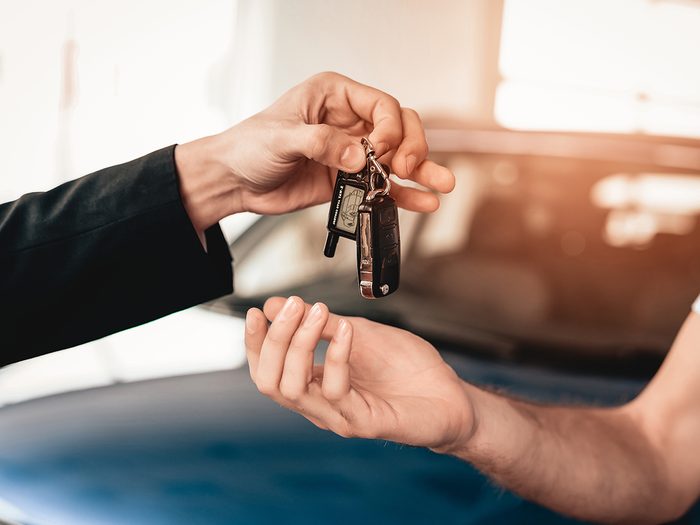What Happens to Your Car When You Trade It In

When you trade in your old car for a brand new model, one of three things can happen.
By the time you invest in your second or third car, chances are you’ve been around the block enough to know that when it comes time to buy a new vehicle, one of your options is to trade in your old one. But what actually happens to your well-loved minivan that you can’t quite get the smell of french fries out of? According to Gregg Fidan, founder of RealCarTips.com, traded-in cars generally go one of three places:
Recondition and resale
Unless you’re trading in a car that is in nearly perfect condition, with low enough mileage, and a close to recent manufacturing date—in which case, why are you trading it in again?—this is not the road that car is going down. A car that is being traded in after a few small dings, or after the owner gets sick of it and wants something a few years newer, is easy enough for the dealership to fix up, put in some of that new car smell, and resell it to someone looking for a nice car at a slight discount.
Wholesale
Say you’re trading in your old trusty truck for a smaller, more environmentally and pocketbook friendly sedan. The dealership you would choose to go to is probably pretty well known for its smaller, more environmentally and pocketbook friendly sedans, which means not a lot of people are walking in looking for a used truck. So instead of taking a loss and letting it sit around in their lot for years, depreciating in value and standing out from their pristine line up, the dealership will drive it down the road to the lot with all the other trucks, and sell it to them wholesale, or trade for the nice used sedan someone just traded in for a truck. According to experts at The Drive, most cars that are traded in will end up here.
Public auction
The third direction for a trade-in to head is to a public auction. “Most of the cars at a public auction are the worst trade-ins or very rough repos,” Steven Lang, owner of a used car dealership told Popular Mechanics. Cars at public auction can be in extremely rough shape. “I’ve personally seen cars with over 300,000 miles on their clocks rolled back to 120,000 and sold as ‘Miles Exempt’ meaning no guarantee of mileage,” Lang said. This is the destination of cars that look like they are a few kilometres away from spontaneously catching fire. Dealerships and even the general public can take advantage of the dirt cheap cars here, but Lang generally recommends against it unless you are a seasoned mechanic.
Now that you know what happens to trade-in cars, discover the fate of all of the cars that don’t get sold.






